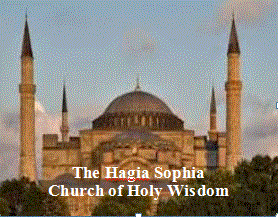 I think that in order to understand our Greek-Catholic Church we must know how it differs from the Roman-Catholic Church, realizing that the historical context within which each Church developed has influenced it. Before a Westernized Christian can hope to understand the Eastern view of the Faith, he must first take a look at the historical trends and events that have shaped the theology of the Western Church. It must always be remembered that the Church is a human organization and is therefore rightly influenced by the societies in which it exists. This is precisely why there is a difference between Eastern and Western Christianity. While one understanding is not right and the other wrong, they are different and equally right. I realize that this flies in the face of what most people have come to believe, namely that there is only one true interpretation of the Catholic Faith. The true understanding of the Catholic Faith is that it is very diverse in its understanding of the major doctrines of the faith and that the power of the Catholic Faith is that it embraces various interpretations and that the various interpretations, as long as they don’t contradict each other, are equally true.
I think that in order to understand our Greek-Catholic Church we must know how it differs from the Roman-Catholic Church, realizing that the historical context within which each Church developed has influenced it. Before a Westernized Christian can hope to understand the Eastern view of the Faith, he must first take a look at the historical trends and events that have shaped the theology of the Western Church. It must always be remembered that the Church is a human organization and is therefore rightly influenced by the societies in which it exists. This is precisely why there is a difference between Eastern and Western Christianity. While one understanding is not right and the other wrong, they are different and equally right. I realize that this flies in the face of what most people have come to believe, namely that there is only one true interpretation of the Catholic Faith. The true understanding of the Catholic Faith is that it is very diverse in its understanding of the major doctrines of the faith and that the power of the Catholic Faith is that it embraces various interpretations and that the various interpretations, as long as they don’t contradict each other, are equally true.
I do not believe that it is necessary to give an exhaustive summary of Western thought, but I do believe that it is important to outline some of the most significant events that have helped shape the average American Christian’s perspectives. Undoubtedly, the best snapshot of these currents could be taken within the Reformation period.
Historians have referred to the Reformation (some say the Protestant Revolution) as the most profound spiritual revolution ever experienced by a people in so short a period of time.” Perhaps this is true, but not every aspect of this revolution was a response to the Spirit. Given the dominant blackness of the times and the general persistent dissatisfaction of people, no one should ignore the sociological, political and economic factors that played an important role in the movement. These factors did not always inspire the people to make clear, well thought out responses to their predicament; they provoked hasty, impulsive reactions, as well.
I will be looking at these reactions and their causes during the coming weeks. It should be remembered that Eastern Christianity never experienced the Reformation first hand. Thus one of the sources of these differences.
